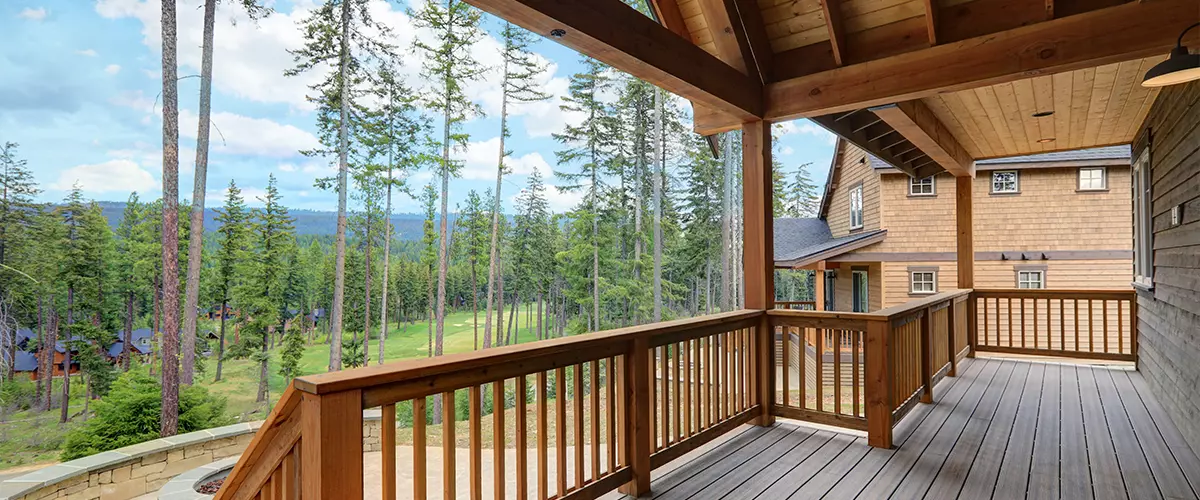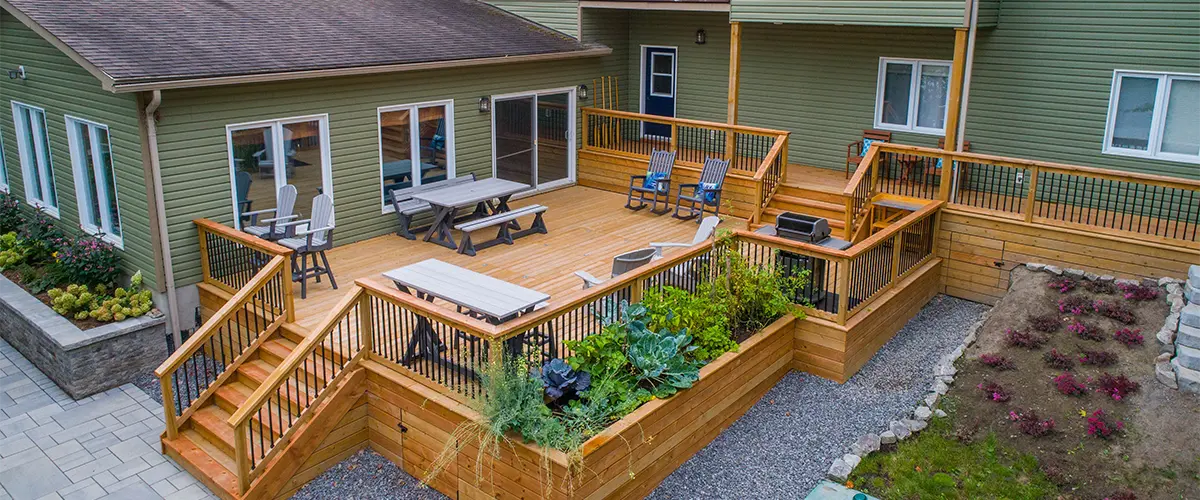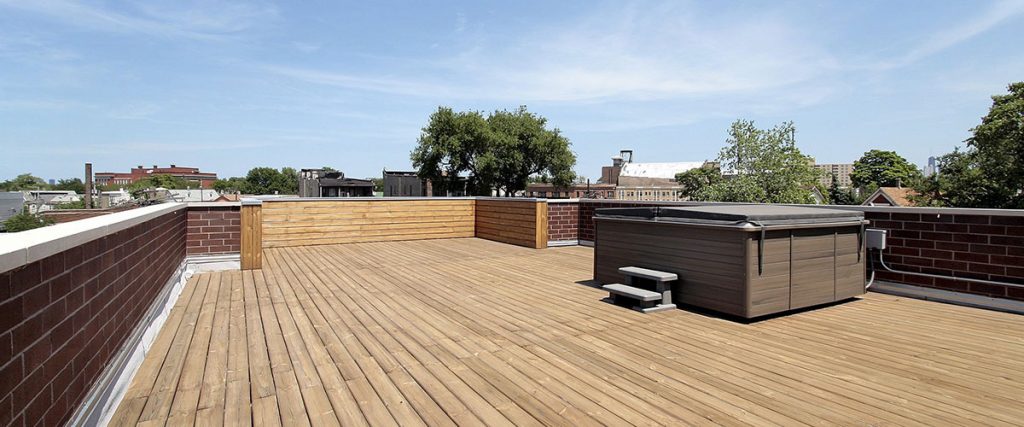Deciding on the right material for your deck in Maryland can be tricky with its varied weather. The state’s climate exposes outdoor structures to everything from hot, humid summers to snowy winters.
This article dives into wood versus composite decking, comparing costs and benefits to find the best fit for your Annapolis home. Discover which decking wins against Mother Nature’s tests!

Wood Decks Vs Composite Decks
In the contest of choosing a decking material for Maryland homes, wood and composite options stand as frontrunners, each bringing unique benefits and considerations to your backyard oasis.
Let’s delve into their characteristics to determine which might be the champion for enduring Maryland’s diverse climate.
Types of wood decking
Choosing the right type of wood decking can define the durability and aesthetic appeal of your outdoor space. Maryland’s varied weather demands materials that can withstand its unique climate conditions. Here are some popular wood decking options for homeowners:
- Pressure-Treated Lumber: This is the most common and economical option. It’s treated with chemicals to resist rot, fungi, and insects, making it a practical choice for Maryland’s humid summers and chilly winters.
- Cedar Wood: Cedar is naturally resistant to moisture, decay, and insects due to its oils. Its rich color fades to a silver-grey if not stained yearly, but many love this weathered look against Maryland landscapes.
- Redwood Decking: Similar to cedar, redwood boasts natural resistance qualities and has a vibrant hue. While more expensive than pressure-treated lumber, redwood requires less maintenance over time.
- Tropical Hardwoods: Woods like ipe or mahogany are incredibly durable and have a luxurious appearance. They’re dense, which makes them resistant to pests and rot but also harder to install.
- Bamboo Decking: A newer addition to the decking scene, bamboo is praised for its sustainability. It’s strong, eco-friendly and offers a modern look that stands up in Maryland’s weather fluctuations.
Types of composite decking
Composite decking offers a blend of aesthetics and performance. Maryland homeowners can choose from several types to suit their style and needs.
- Capped Polymer: This type of composite decking is highly durable and resistant to the weather in Maryland. It’s made from a blend of plastic polymers, which means it won’t rot or warp from moisture. The outer shell provides added protection against stains and fading.
- Capped Composite: Combining recycled wood fibers with recycled plastics, capped composite decks have added durability thanks to their protective outer layer. Maintenance is minimal, which is a relief for busy homeowners.
- PVC Decking: Unlike other composites, PVC decking contains no wood at all, providing exceptional moisture resistance. They are lightweight and available in a variety of colors, making them popular among those who prioritize low maintenance and high style.
- Uncapped Composites: These are budget-friendly options but offer less protection from the elements compared to capped versions. They require more maintenance but can still be a cost-effective choice for some families.
Pros and cons of wood and composite decking
In making a decision between wood and composite decking, it’s essential for homeowners to weigh the advantages and disadvantages of each. Below is a table that summarizes the pros and cons to help make an informed choice.
| Aspect | Wood Decking | Composite Decking |
|---|---|---|
| Cost (Initial) | Typically less expensive upfront. | Higher initial investment than wood. |
| Maintenance | Requires regular staining and sealing. | Low maintenance; occasional cleaning needed. |
| Moisture and Insect Resistance | Prone to moisture damage and insect infestation. | Resistant to moisture and insects, does not rot. |
| Appearance | Classic, natural look but may have inconsistencies. | Consistent appearance; range of color and pattern options. |
| Sustainability | More eco-friendly if sourced from sustainable forests. | Often made from recycled materials, reducing waste. |
| Durability | Can last 10-30 years with proper care. | Designed to last 25-30 years with little fading or wear. |
| Long-term Costs | Long-term costs can add up due to maintenance. | Higher upfront cost but lower long-term maintenance expenses. |
Homeowners should carefully consider these factors before choosing the decking that best fits their needs and lifestyle.

Key Factors to Consider When Building A Deck In Annapolis, MD
In Annapolis, MD, the unique climatic challenges and coastal weather conditions call for careful consideration when choosing materials for your decking project. Understand how these factors directly affect the performance and lifespan of your deck to make an informed decision that aligns with both your aesthetic preferences and functional needs.
Considering the numerous options available in the decking market, exploring reputable brands can significantly aid your decision-making. To delve deeper into some of the leading composite decking brands, offering durability and performance even in Maryland’s diverse weather conditions, check out our detailed analysis of the top 5 composite decking brands.
Cost (upfront and long-term)
Choosing between wood and composite decking affects your pocketbook differently at different stages. Wood decks generally cost less upfront compared to composite decking. The initial savings, however, don’t tell the whole financial story.
Maintenance costs must be considered as part of the long-term investment.
Composite decking usually comes with a higher price tag initially but can save money over time. With its durability and low-maintenance requirements, you won’t spend as much on repairs or upkeep compared to traditional wood decks that need regular staining and sealing to combat Maryland’s weather conditions.
This means more predictable expenses without unexpected maintenance costs creeping up on you.
Maintenance
Maintaining your deck is crucial for keeping it in great condition for years to come.
Wood decks demand regular care, including staining or sealing every couple of years. This helps protect against moisture that can lead to rot and decay.
To prolong the life of a wood deck, you’ll also need to wash and check for any loose nails or boards annually.
Composite decking offers a different experience; it’s designed to resist weathering, warping, and bugs with minimal upkeep. You won’t need to stain or seal a composite deck—just some soap and water are enough to keep it clean.
Spills wipe away easily, preventing stains, which makes composites perfect if low maintenance is high on your priority list. The cost of composite decking might be higher initially but think about the time and money saved on upkeep in the long run.
Moisture and insect resistance
Choosing the right decking for Maryland’s humid summers and wet winters is crucial. Composite decking thrives in these conditions, offering high resistance to moisture, which can lead to wood rot and decay over time.
Unlike traditional wood, composite materials don’t allow for insect infestation, saving you from termites and other wood-loving bugs that could compromise your deck’s integrity.
Consider the long-term benefits of a composite deck when weighing the upfront cost of materials. It stands up against weather elements far better than natural wood options without the need for constant sealing or staining.
Homeowners find peace of mind knowing their investment is protected against common issues that can lead to costly repairs down the road.
Appearance
Beyond resistance to moisture and insects, the appearance of your deck significantly impacts your home’s curb appeal. Wood decking offers a timeless, natural look with its rich grains and warm hues.
Over time, it develops a silvery-gray patina that many homeowners find appealing. Staining or painting wood can also match your specific style preferences.
Composite decking, on the other hand, comes in a variety of colors and textures designed to mimic the look of real wood without demanding as much maintenance. The color stays consistent over the years, which means no fading or staining is necessary to maintain its appearance.
This can be a major plus for busy homeowners who value durability alongside an attractive exterior feature.
Sustainability and environmental impact
Making a sustainable choice for your deck in Annapolis, MD is more important now than ever. Wood decking comes from trees, but choosing wood doesn’t always mean harming the environment.
Look for wood that has been responsibly harvested and carries the Forest Stewardship Council (FSC) certification. This ensures that the cost of wood isn’t too high on nature.
Composite decking boasts its eco-friendly advantage because it’s often made from recycled plastics and waste wood fibers. These materials might otherwise end up in landfills, so using them can help reduce waste.
Homeowners get to enjoy a durable deck while supporting recycling efforts, making composites an appealing option for those concerned with environmental sustainability.
Durability
Shifting focus from environmental concerns, we turn to the strength and longevity of decking materials. Wood decks bring a classic charm but can show wear over time due to Maryland’s fluctuating weather.
They may warp, split, or rot when exposed to moisture, leading homeowners to replace planks or reseal the surface more frequently. On the other hand, composite decking promises a longer life span with its blend of wood fibers and plastic components.
These boards resist fading, staining, and scratching far better than traditional wood options.
Composite decks stand up well against Annapolis’s humid summers and chilly winters without requiring much upkeep. The material doesn’t splinter or decay like wood often does after harsh weather hits.
With proper installation and minimal maintenance, composites provide peace of mind for homeowners who value durability alongside aesthetics in their outdoor living spaces. A sturdy deck boosts your home’s appeal while saving you headaches down the road – a solid investment in Maryland’s dynamic climate.

Conclusion
Embarking on a new deck building project in Maryland presents you with exciting choices. Consider wood for its classic charm or opt for composite decking to minimize upkeep. Select the material that best aligns with your priorities, whether it’s longevity, aesthetics, or eco-friendliness.
Your Annapolis home can shine with the perfect outdoor space tailored to withstand local weather conditions. Make a choice that ensures years of enjoyment and value enhancement for your property.
